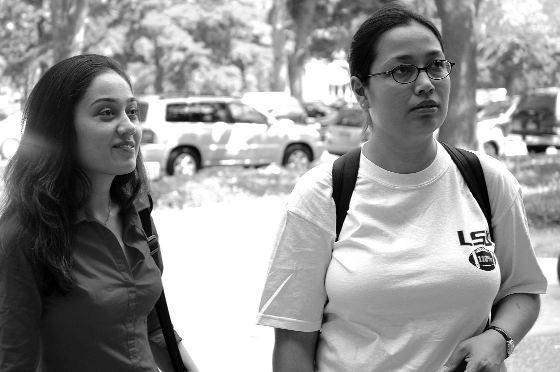Nelofar and Farahnaz Wafa hurt for the millions of evacuees from along the Gulf Coast who have fled the horrific damage from Hurricanes Katrina and Rita.
But the bleak TV images these sisters see are grim reminders of their own escape from a harsh reality – the Taliban government in Afghanistan.
Nelofar, 30-year-old international studies senior, and Farahnaz, 25-year-old studio art senior, said Katrina brought back memories of carrying only a small bag of belongings as they fled their home as political refugees.
“I’ve never been in a hurricane, but I know how it is to leave your home and take off with nothing,” Farahnaz said.
Though they agreed the two situations were vastly different, the Wafas said the emotions Afghani refugees and Gulf Coast evacuees feel have common elements.
“There is definitely a difference between nature and man-made disasters,” Nelofar Wafa said. “But the feeling of living in a state of uncertainty is the same, I’m sure.”
The Wafa sisters fled the Mujahidden overthrow of the communist government in 1992 with their mother and two brothers. Their father was killed by members of the communist government in 1984.
The Taliban seized power in Afghanistan in 1994.
“We left for Pakistan for two weeks in 1992, intending to return [to Afghanistan],” Farahnaz said. “We only brought enough clothing for that time, but we couldn’t go back because the borders were closed. It was getting really bad there.”
Nelofar said her family had to bribe a Pakistani police officer to get into the Pakistan, which borders Afghanistan on the east.
“It wasn’t a problem,” she said. “It didn’t take much.”
Once in Pakistan, the Wafas moved in with relatives, where the sisters taught elementary school, until they were able to get to New York in February 2001.
While in New York, the Wafas met representatives from Baton Rouge Catholic Life Center, who facilitated their move to the University. The sisters received scholarships from the Feminist Majority Foundation, a national organization dedicated to supporting women’s equality.
Nelofar said she and Farahnaz settled in quickly and began enjoying their new life in Baton Rouge.
“It wasn’t hard to assimilate,” she said. “When I walk around, I saw people who were very kind.”
Farahnaz said the United States she had moved to was quite different from the picture of the United States she had seen in movies when she and Nelofar were growing up.
“I grew up watching heroes like Rambo, Schwarzennager and Van Damme doing amazing things,” she said. “But when I came here, I met people just like me.”
But on Sept. 11, 2001, the Wafas watched the nightmare that forced them to flee their native country unfold in the United States as terrorists attacked New York and Washington.
Nelofar said she felt like they would never escape the horrors of the Taliban.
“I could only call my mother and say, ‘Mom, they have followed us here,'” Nelofar Wafa said.
Nelofar said her family endured overt discrimination after the attacks.
“Someone once told me that Osama Bin Laden was my uncle,” she said. “But I never hid the fact that I was from Afghanistan. I felt that my days of being afraid to identify myself were over.”
Farahnaz said she would have felt guilty if she had hidden her heritage.
“For me, not mentioning where I was from meant accepting guilt for 9/11, and I couldn’t do that,” she said. “It wasn’t me or my country doing 9/11, it was the work of a few radicals.”
In spite of the insults the Wafas heard, they said they fell in love with the United States.
The Wafas said they think of the United States as their home and are tormented to see anyone here stranded, without a home, as they once were.
“No amount of money can bring back what was special about your home, but there are people helping you,” Farahnaz said. “People care.”
Contact Jeff Jeffrey at jjeffrey@lsureveille.com
A Similar Situation?
September 28, 2005

Nelofar and Farahnaz Wafa attend the University as refugees from their native Afghanistan. The sisters have compared their experience of fleeing the Taliban government to that of Gulf Coast evacuees following Hurricanes Katrina and Rita.
A Similar Situation?



